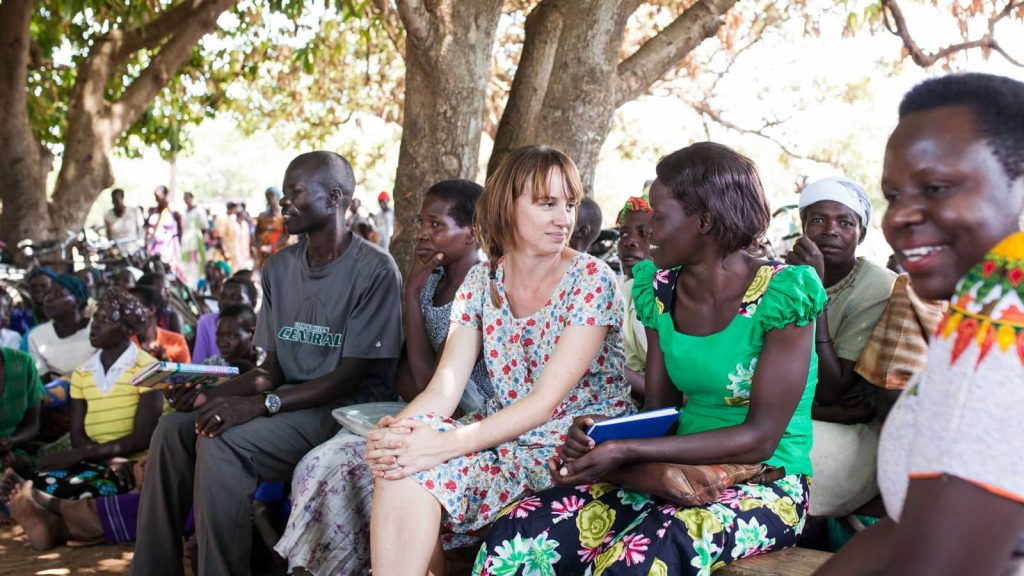In her first article for TheLatch—, Love Mercy Foundation CEO Caitlin Barrett shares how she’s helping women fight poverty in Uganda.
Working with women is a pleasure I have had for the last 10 years. I founded an international NGO a decade ago — The Love Mercy Foundation — and since then have built an all-female team, a female-headed board, and a successful community development project which this week will reach over 17,800 women in northern Uganda.
International Women’s Day is naturally one of my favourite celebrations on the calendar. To its detractors, it’s an unfair waste of time that places too much emphasis on women and leaves men in the dark. The number of times I’ve seen angry Facebook posts demanding an International Men’s Day has left my eyes sore from intense rolling. For most, it’s a good excuse to have a Friday lunch in the office and celebrate being female. Girl power etc. For me, its an opportunity to stop and reflect on the achievements of women, and the social and economic barriers that are still yet to be overcome.
“For me, it’s an opportunity to stop and reflect on the achievements of women, and the social and economnic barriers that are still yet to be overcome.”
This year’s theme is ‘Each for Equal’ — recognising that gender equality is essential for economies and communities to thrive. So there is no better day in the calendar to celebrate the fact that Love Mercy’s Cents for Seeds project is actually no longer needed in one remote village in northern Uganda.
In 2010 as a young and very green international studies student, I visited the village of Barr. Within minutes, I met a woman who was holding a tiny newborn baby. It was my first trip to Uganda as part of my role as founding CEO of Love Mercy Foundation, an organisation I established to restore hope in northern Uganda after decades of civil war. Sunta was her name and she immediately caught my eye and introduced herself and her baby Emmanuel to me. She told me that he was very sick and that she had no way of paying for him to go to the hospital for treatment.
Fortunately, she was participating in our Cents for Seeds project which assisted her to earn her own income through farming. Each woman is loaned a 30kg loan of seeds for her to plant in her garden. She goes through an agricultural training program with our team of (all female) Ugandan agriculturalists and is given a gardening tool to ensure she can get the most out of her crop. She attends a village savings and loans group which gives her a safe place within easy access of her home to save money and earn interest, and then withdraw a loan when necessary. Often these women cannot access traditional banks due to distance, and a lack of ID to open an account.
Sunta became my inspiration when I returned to Australia and began to build Love Mercy. She was hard-working, always had a smile on her face, and despite the immense loss that she experienced having given birth nine times and losing six babies, including the tiny boy Emmanuel that I met that day, she never gave up. That was ten years ago and every year since then, despite drought, flood and even a plague of locusts, Sunta has managed to earn an income to provide for her remaining children and contribute to her community. All through the loan of 30kg of seeds.
“Often these women cannot access traditional banks due to distance, and a lack of ID to open an account.”
Gender equality is a long way off both in Uganda and in Australia too. However, the gains that have been made in this little village are significant. When we first began, the husbands to the 100 women who came to the first-ever Cents for Seeds meeting were unimpressed. Some women were not allowed to even attend. Others were beaten and scolded for attending anyway. The program rocked the normal way things go in this part of the world — men are the head of the household, and therefore are given everything. We had men come up to us and ask us, “why are you giving this bag of seeds to my wife and not to me?” It was a fair enough question.
We found that in Uganda poverty was focusing particularly on women and children, and so we decided to do the same. Women are the caretakers for their families, with an average of seven children, they have a lot of hungry mouths to feed and often have sick people to care for, and elderly relatives to tend to. If you give them a hand up the whole family benefits. If the whole family benefits, suddenly the entire community is more resilient.
It just so happens that this Sunday, on International Women’s Day, Barr will become the first village to graduate from Cents for Seeds, having reached a point of self-sufficiency. These women have taken every possible opportunity to improve their lives, and have come to us now and said, “Thanks for your help — we’ve got this from here.”
Giving a woman a bag of seeds can have profound impacts beyond just food and income — but now, after 10 years of slowly sowing the seeds of change, I am so happy to have done ourselves out of a job. I know that there are literally thousands of women waiting for a loan just like it — and if we can create happy, healthy homes just like the 417 homes in Barr village, we will be one huge step closer to equality.
Keen to help? You can become a changemaker by visiting Love Mercy and joining its Cents for Seeds program.

